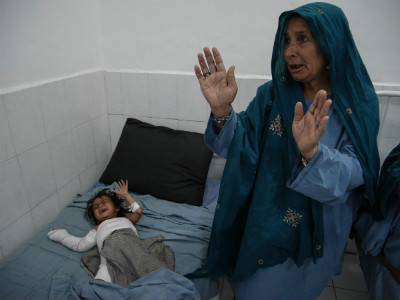Afghanistan has one of the worst healthcare systems in the world, with many having little or no access to medical treatment.
Years of civil war have devastated the healthcare infrastructure, and unlike other countries in the region, Afghanistan has seen increasing rates of preventable diseases such as diarrhoea and respiratory infections.
According to The World Bank, about one in 10 children will die before reaching the age of five, and there are about 396 deaths per every 100,000 births - well above the 2015 world average of 216.

A child cries in the inpatient war of Boost Hospital in Lashkargah, Helmand province. A study by medical NGO Doctors Without Border (MSF) found that 80 percent of patients here faced conflict-related delays in reaching the hospital, including checkpoints, landmines, and fighting almost every day. (Photo: Karishma Vyas/Al Jazeera)
And as fighting rages in the south of the country, there are growing fears of a new humanitarian crisis as the young, sick and elderly flee advancing Taliban fighters.
So far, around 30,000 people have sought shelter in Kandahar, but Al Jazeera has learned that the provinces poorly funded hospitals are struggling to cope with the sudden influx.
"We lack accommodation and don't have enough personnel," Ali Ahmed Qani, a surgeon at the Mirwais hospital, said. "If the hospital's capacity was increased, then we would have one bed for one patient. We could also offer good hygiene and provide proper services to our patients."
As many as 29,000 people are believed to visit Mirwais each month, but staff and patients have said the facility can't offer basic treatment.
"This hospital has many problems," Gulaba, who brought her two-year-old granddaughter to the hospital told Al Jazeera.
"There are a few doctors and they cannot treat patients as there are many sick people. There are four patients lying on a single bed. It is very difficult to feed, give medicine or take care of patients."
Wahid Majrooh, a spokesman for the Ministry of Public Health, told Al Jazeera that the government understood the problem and had earmarked areas it was looking to improve.
"In Kandahar province we need to increase healthcare facilities in pediatric, obstetrics and gynaecology," he said.
"We are also trying to invest in districts and rural areas where they need basic health facilities to ensure primary healthcare is being provided to the local population," Majrooh added.
The Taliban currently controls or contests 10 of the 14 districts in Helmand, the deadliest province for British and US forces in Afghanistan over the past decade, and recent fighting there has made the roads unsafe for those seeking help in neighbouring Kandahar.
"Some patients are dying trying to reach the hospital," Doctor Hayatullah told Al Jazeera.
"There are no hospitals in the neighbouring provinces and no clinics in some districts."



